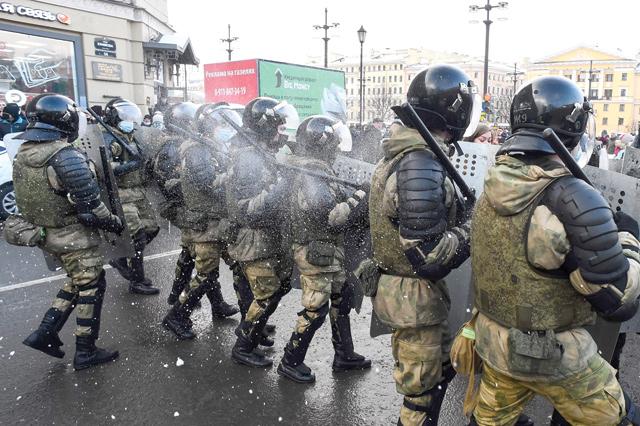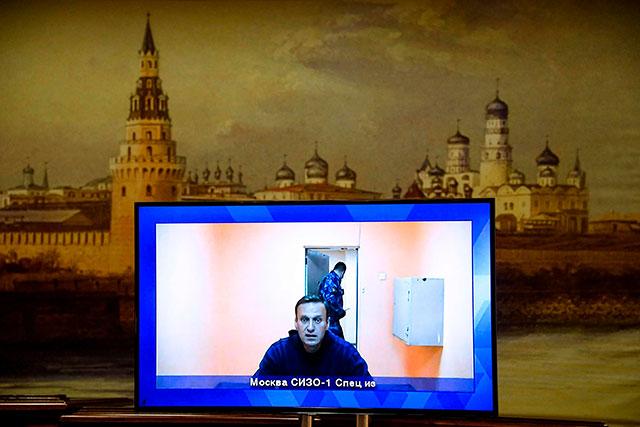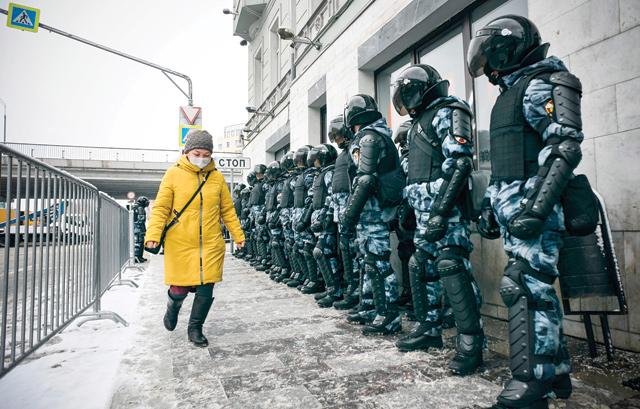You are here
Kremlin accuses US of meddling after 3,500 protesters detained
By AFP - Jan 24,2021 - Last updated at Jan 24,2021
MOSCOW — The Kremlin on Sunday accused the United States of interfering in Russia's domestic affairs and downplayed the scale of the weekend's protests, when tens of thousands rallied in support of jailed opposition politician Alexei Navalny.
More than 3,500 demonstrators were detained in protests across the country on Saturday, with several injured in clashes with police in Moscow, following Navalny's call to rally against President Vladimir Putin's 20-year rule.
The West has widely condemned the "harsh tactics" used against demonstrators, with French Foreign Minister Jean-Yves Le Drian saying on Sunday the mass arrest of protesters was "an intolerable affront" and a "slide towards authoritarianism".
EU foreign policy chief Josep Borrell has said the bloc would discuss "next steps" on Monday.
Putin's spokesman Dmitry Peskov on Sunday accused the US embassy of interfering in Russia's domestic affairs after the mission distributed a "demonstration alert" to US citizens in Russia recommending they avoid protests.
"Of course, these publications are inappropriate," Peskov told a state TV channel. "And of course indirectly, they are absolutely interference in our domestic affairs."
A US mission spokeswoman said US embassies and consulates around the world routinely issue safety messages to US citizens.
"This is a common, routine practice of many countries' diplomatic missions," she told AFP on Sunday.
The US embassy in Moscow on Saturday said that Washington supported "the right of all people to peaceful protest, freedom of expression".
Protests in over
100 cities
Peskov also accused protest organisers of seeking to "rock the boat" and said the number of people who had demonstrated paled in comparison to Putin supporters.
"A lot of people vote for Putin," Peskov said, pointing to last year's constitutional plebiscite that allowed 68-year-old Putin to remain in power until 2036.
Navalny, Putin's most prominent critic, was arrested on returning to Moscow last weekend following months of treatment in Germany for a near-fatal poisoning with a Soviet-designed Novichok nerve agent.
He then called for Saturday's unauthorised protests, which took on an unprecedented geographic scale, spanning more than 100 cities.
Around 20,000 people protested in Moscow and more than 10,000 in Saint Petersburg, according to estimates from AFP journalists, with rallies also held in numerous countries including France and Lithuania.
Leonid Volkov, the head of Navalny’s regional network, praised the turnout.
“I am certainly proud, very impressed and inspired,” Volkov told AFP. Navalny’s team is hoping to stage another rally next weekend.
Many at the protests said they were angered by the findings of a Navalny investigation into an opulent Black Sea property allegedly owned by Putin.
The two-hour report, which claims that Putin owns “the world’s most expensive palace” allegedly financed through a massive corruption scheme, has been viewed nearly 80 million times on YouTube.
Peskov said the luxury mansion on the Black Sea was “private” property and had nothing to do with Putin.
Moscow officials said that 29 people received medical assistance in hospitals and were released.
Saint Petersburg prosecutors said they were probing violations on “the part of law enforcement” and the use of force against a woman.
The Investigative Committee, which probes major crimes, said it had launched criminal inquiries in Moscow over the use of violence against law enforcement, hooliganism and property damage.
In a separate statement, investigators said a 36-year-old man was detained after hitting two policemen at the Saint Petersburg protest.
The OVD Info monitor said police seized at least 3,521 protesters, with 1,398 people detained in Moscow and 526 in Saint Petersburg.
The head of the Kremlin’s human rights council, Valery Fadeyev, said most of those detained in Moscow had been released.
He also defended the detentions, saying the protests were illegal and took place during a coronavirus pandemic. “I see no violations whatsoever,” he said.
Navalny, who rose to prominence a decade ago, accuses the FSB security agency of seeking to poison him on Putin’s orders.
He is the target of several criminal probes and supporters fear authorities are planning to sentence him to a long prison term.
Related Articles
MOSCOW — Russian prosecutors on Monday backed a request to imprison opposition leader Alexei Navalny for several years on old embezzlement c
MOSCOW — Jailed opposition politician Alexei Navalny on Thursday denounced Kremlin pressure and a biased judiciary during a hearing in which
MOSCOW — Police locked down the centre of Moscow and other cities on Sunday as protesters took to the streets across Russia demanding the re














